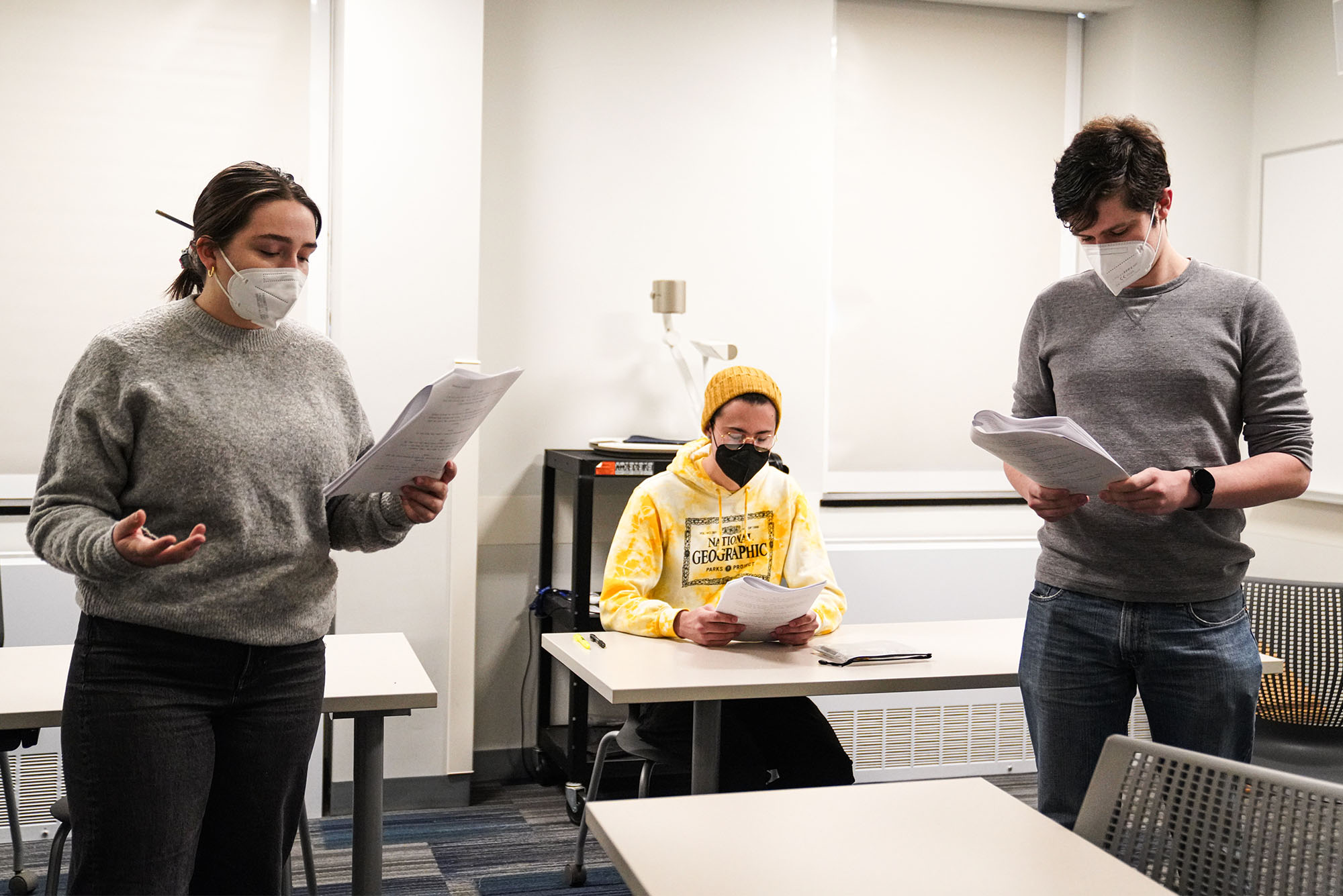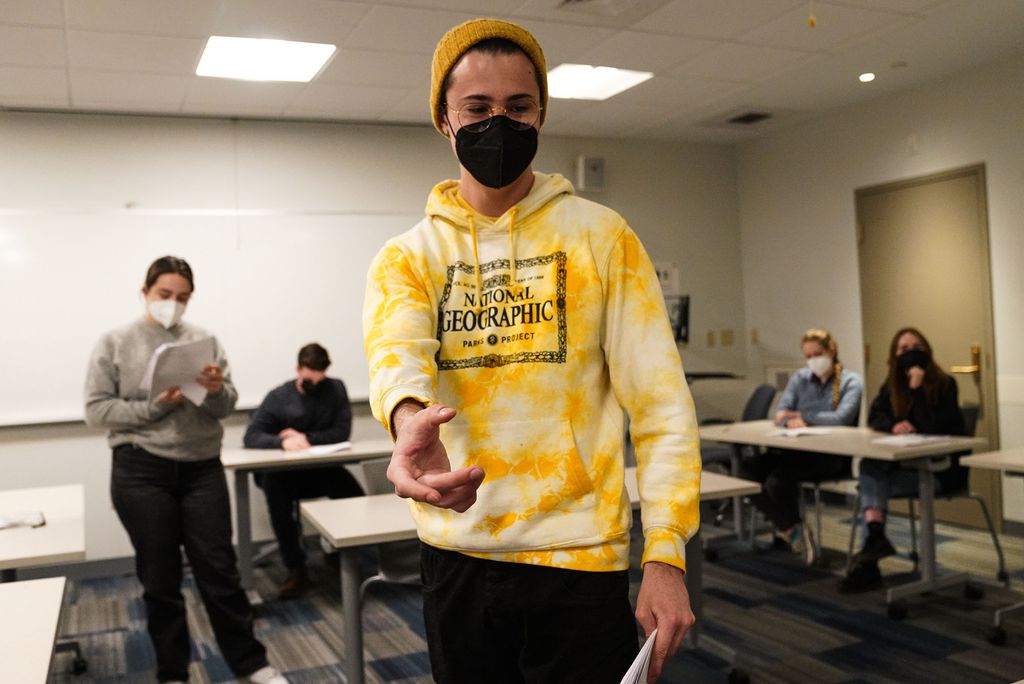Our STEM Era Needs the Humanities, Undergrad’s Play Argues

Lindsay Allebest (CAS’23) (from left) as the prosecutor, Nic Rowe (CAS’23) as Shakespeare, and Bruce Hallgren (CAS’22) as Dido rehearse for a play written by Alexandra Mascarello (CAS’23) that defends humanities studies.
Our STEM Era Needs the Humanities, Undergrad’s Play Argues
Alexandra Mascarello’s drama, set in Purgatory, features Aristotle, Virgil, Shakespeare, and Rousseau
Having wisdom teeth extracted doesn’t goad most people into crusading for the humanities. But Alexandra Mascarello had a chatty doctor for her teen-years surgery, and when she let drop that she hoped to major in philosophy in college, he “advised me to get a minor in business,” Mascarello (CAS’23) recalls, “because it would then make my résumé more practical, give me some sort of practical application in life.
“To be fair,” she says, “I’ve had many very supportive doctors and strangers in my life say very nice things about what [I’m] studying.” But she’s heard too many stories from fellow humanities majors about skeptics predicting their pending unemployment. “I wanted to just write something out that really expressed how close-minded that is.”
So in our STEM-obsessed era, Mascarello chose an ancient medium, playwriting, as her rampart for her Undergraduate Research Opportunities Program (UROP) project. (UROP provides funding for undergrads’ faculty-mentored research in the humanities, natural sciences, medicine, arts, and education, pairing them to work on research outside the classroom.) Defense of the Humanities is set in Purgatory, where icons of the Western canon—Aristotle, Virgil, Shakespeare, and Jean-Jacques Rousseau—are on trial, defending their works as still relevant and deserving to remain in the pantheon of great books. Each author is judged by the others, under the watchful eye of the presiding judge—Homer. And the sympathetic interrogator who makes the dead authors defend themselves, hoping to spring them? Mascarello herself.
BU Orientation is considering putting on the show for incoming students this summer, as is the College of Arts & Sciences Core Curriculum, the college’s elective interdisciplinary program. Mascarello hopes to convey two messages for audiences: yes, the humanities are as important as ever. But the canon also must diversify beyond what’s colloquially known as Dead White Men (DWM).
Her drama includes no writers who are female or of color (although a couple of women are mentioned by the DWM as canonical. There is also a brief appearance by a fictional woman: Dido, the forsaken lover of the hero in Virgil’s Aeneid.) The absence of diversity is no oversight: the defendants are being tried for exclusivity as well as relevance.

At the same time, the prosecutor doesn’t conceal her support for studying these greats, along with philosophy, history, the classics, and literature in general. “They’re not necessary because of the job market or employment opportunities,” she explains at one point, “they’re necessary because they teach empathy and connection and reinforce progress.” (The prosecutor has real-life allies outside BU who suggest that the critical thinking honed by the humanities is essential to current social justice efforts.)
Valuing the humanities while diversifying them “reinforces each other, because they’re necessary for each other,” Mascarello tells BU Today. “In a world that may increasingly adopt a narrative that the humanities are less practical, less relevant, it’s important to remember that they encourage those ideals of diversity and inclusivity.”
Her inquisitor character veers between praise and exasperation: approving how Shakespeare critiques Hamlet’s mistreatment of women, while grilling Aristotle for his belief in women’s biological inferiority. (“You’re supposed to be defending my place in the canon,” he protests. “You make it so hard!” she snaps back.)
Mascarello’s character is played by her friend Lindsay Allebest (CAS’23) (and for the record, a history major). “I agree with what Allie’s doing, talking about the diversification of the canon,” Allebest says. “I think that this is an important conversation.”
As for portraying a friend who also happens to be the playwright? No pressure, says Allebest: “I think Allie’s meant almost to represent an archetypal student. It’s just like playing another character, one that I maybe understand a little bit more from the get-go.”
Kyna Hamill, a CAS master lecturer and Core Curriculum director, is Mascarello’s UROP faculty mentor. The two women oversaw a late-winter rehearsal in a CAS classroom that demonstrated not just the fun of UROP, but its crucible of creativity.
A novice playwright, Mascarello typed furiously on her laptop as Hamill and the actors suggested tweaks to the script. Hamill, who found Shakespeare a flat character lacking personality, spitballed the idea of putting an Elizabethan-sounding “th” at the end of some words. “You’re writing it as if we are reading it, not hearing it,” she advised Mascarello, urging her to unshackle her imagination. “There are techniques to smoothing out the dialogue.…You can do whatever you want. This is the theater.”
Overall, she and the cast complimented Mascarello’s script. “It’s obviously really well written and funny,” said “Homer,” aka Aiden Cardozo (CAS’24). “I was laughing up there [during rehearsal].” (“You’re just saying that ’cause I’m president of the club,” quipped Mascarello, who presides over BUs Undergraduate Philosophy Association.)
Hamill says the play “kind of started as an elaboration” on an assignment Mascarello did in a class—Making the Modern World: Progress, Politics, and Economics—for the Core Curriculum.
”It was going to originally be a dialogue, but since my background is in theater, working with her on a play was a more natural fit,” says Hamill. “It was also fun to bring other students to workshop and read it over Zoom. Community-building is very important for Core, so all these projects try to bring people together to see, use, and comment on the projects.”
That community-building is a metaphor for the broader (read: diverse) humanities canon the play advocates. “That lesson of how to analyze and how to criticize from multiple viewpoints,” Mascarello says, “…also comes [with] the need to make humanities learning more accessible for everybody and for all viewpoints.”
Comments & Discussion
Boston University moderates comments to facilitate an informed, substantive, civil conversation. Abusive, profane, self-promotional, misleading, incoherent or off-topic comments will be rejected. Moderators are staffed during regular business hours (EST) and can only accept comments written in English. Statistics or facts must include a citation or a link to the citation.